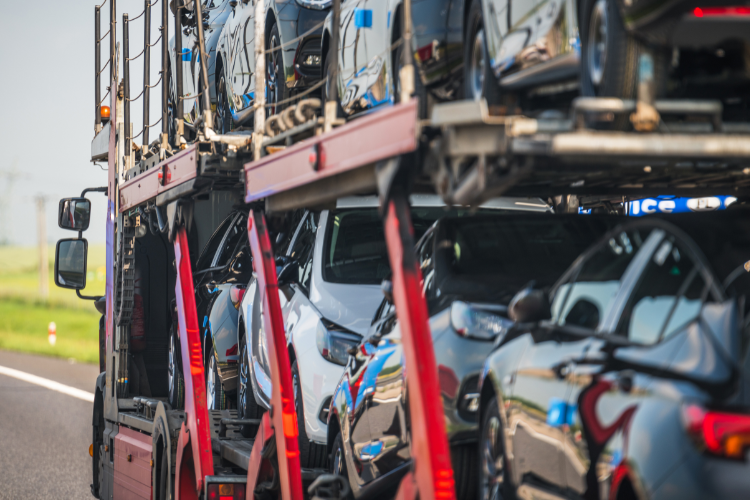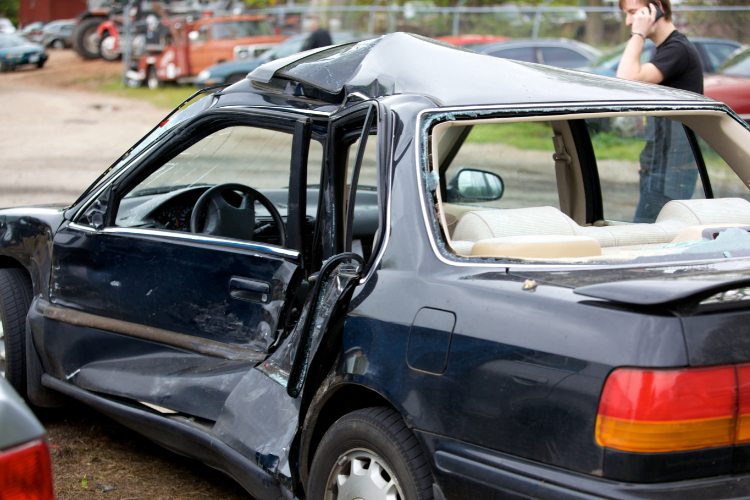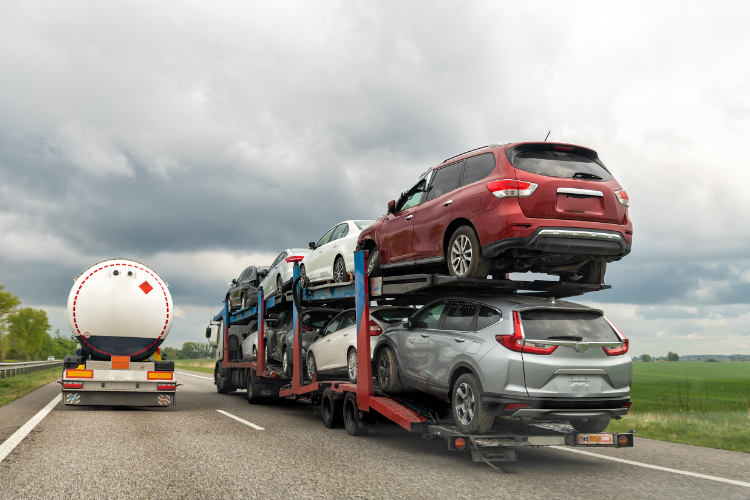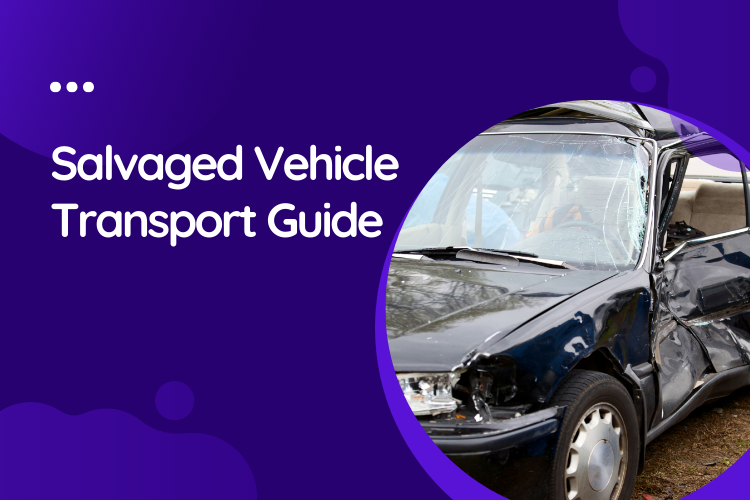Confidence and trust in the transport company are as important as the mechanics of organizing and arranging car shipments and deliveries. So it’s important to choose an auto transport company that is reliable, trustworthy and comfortable to work with.
Protip: It is recommended to opt for a reputable car transportation company that has shining customer reviews or better yet, has an A+ rating from the Better Business Bureau.
In this blog, we’ll explain the intricacies of wrecked car transport, the steps to shipping a wrecked car, and answer frequently asked questions.
Key Takeaways
- A salvaged vehicle is a car that has been severely damaged and declared a total loss by an insurance company. However, it can still be repaired or sold, hence the term salvaged is used.
- Transporting a salvaged vehicle often requires specialized equipment and expertise due to the fragile condition of the car.
- Sherpa Auto Transport can handle wrecked vehicles, offering professional solutions to move your damaged car safely.
- Shipping a wrecked car from auction involves extra documentation, proper equipment, and planning.
- Vehicles with salvage titles can be shipped, but following legal requirements and working with a trusted transport service is crucial.
In This Guide:
- Salvaged Vehicle Transport Guide
- Factors To Consider
- What is a Salvaged Vehicle?
- How Does Salvaged Vehicle Transport Work?
- How Does Shipping a Salvage Car Work?
- Tips for a Smooth Salvage Car Shipping Experience
- Can Sherpa Ship Salvaged Cars?
- How to Ship a Salvaged Car from Auction
- How to Ship Cars with Salvage Titles
- Salvaged Car Shipping FAQs
Salvaged Vehicle Transport Guide

Transporting a wrecked car can be tricky as it requires the right skills to ensure safe transportation without further damage. Choosing the right auto transporters can give you peace of mind while they worry about making the commute easy and convenient.
Protip: Select auto transport companies bonded, insured, and registered with the Department of Transport (DOT) to ensure they provide professional services. The services comprise appropriate carriers and drivers, followed by an inspection report at pickup and delivery.
Factors To Consider
Several factors need to be considered in wrecked car transport, including:
- Cost and budgeting
- Distance to be traveled
- Vehicle size
- Year, model, and make
- Present condition
- Mode of Transportation
Precaution: If you’re considering buying salvage cars at auctions, choose wisely. Ensure you evaluate the condition thoroughly and assess the potential repair costs before deciding. Unfortunately, auction scams are very common!
Lastly, opt for a transport company that fits your needs and budget. Budgeting is significant; ensure you have access to various secure payment options.
Remember these tips, and you’ll know what factors to consider when seeking professional assistance to ship your salvage vehicle.
What is a Salvaged Vehicle?
Salvage cars are wrecked cars that have sustained severe damage and have been declared a total loss by an insurance company.
Reasons behind such declarations could range from accidents to natural disasters, such as flooding, to other unforeseen incidents. Typically, these vehicles have endured significant damage to their body, engine, or other critical components, which makes them “unfit” or “unsafe.”
This is primarily the reason why handling and loading these wrecked cars require skill and equipment to prevent further damage and transport them safely.
How Does Salvaged Vehicle Transport Work?
Salvage car transport is referred to as the specialized service where a team of experts manages transporting damaged, wrecked, or totaled vehicles.
Since wrecked cars are often in fragile condition, transporting them comes with unique challenges that aren’t typically part of standard auto shipping.
Some of these include:
- Properly securing any loose parts that might be at risk of falling off.
- Addressing potential fluid leaks and ensuring they’re contained safely.
- Making sure the vehicle is fully stabilized and securely fastened during transport.
- Comply with specific documentation requirements and ensure all legalities are fulfilled.
This proactive approach ensures a safe and reliable transport of salvage cars. It’s important to find a qualified auto transporter.
Check out Sherpa Auto Transport for your car shipping needs. Our trusted carriers haul salvage vehicles with the equipment and knowledge to handle them properly. With Sherpa, you can trust your salvage car shipment to reach your destination safely.
How Does Shipping a Salvage Car Work?

Shipping a salvage car requires specialized equipment and handling techniques. These techniques help to safely load, secure, transport, and unload the vehicle.
As mentioned above, transportation of salvage vehicles requires the use of specialized equipment.
Some options for transporting these vehicles include:
- Flatbed carriers: As the name suggests, flatbed carriers have a flat-level bed, which is ideal for transporting inoperable and damaged cars.
- Tow trucks: Tow trucks are used for towing vehicles that are not in running condition.
- Enclosed trailers: Enclosed trailers protect valuable or delicate salvage vehicles during transport and prevent any loose parts from going missing during the commute.
- Rollback carriers: Rollback carriers have a hydraulic bed that can be tilted to load and unload vehicles.
Each option has its own benefit and is suitable for different types of salvage vehicles. However, some factors are evident, such as enclosed carriers, which may be chosen over open carriers to offer additional protection from environmental hazards.
Furthermore, safety is of utmost importance during transport. Straps and winches are utilized to secure the vehicles on the carrier properly.
Tips for a Smooth Salvage Car Shipping Experience
Now that we have comprehensively understood the damaged vehicle transport process, let’s consider some tips to facilitate a seamless transport experience.
1. Effective Communication
Good communication with the transport company is vital. It helps avoid misunderstandings and ensure proper vehicle handling.
2. Documentation of Damages
Before shipping, make sure you thoroughly document existing vehicle damage with photos. Provide clear evidence for any claims regarding new damages incurred during shipping.
3. Detailed Inspection on Delivery
Once delivered, conduct a detailed inspection. Test drive the salvage car to confirm that everything is functioning as expected. Make sure no new damages have occurred during transport.
These practices will help ensure a successful transport experience and provide peace of mind throughout the shipping process.
Can Sherpa Ship Salvaged Cars?

Yes! At Sherpa Auto Transport, we offer services tailored to transporting damaged vehicles, whether operational or non-operational.
We have an excellent track record of reliability, affordability, and excellent customer service. Luckily, you don’t need to spend hours scouring online forums for reviews.
Sherpa is driven to provide what every car shipping customer deserves: a transparent and stress-free auto transport experience. We are a reliable auto transport company you can count on for every season of life.
Our expert carrier partners make sure that your car is transported with care and efficiency, irrespective of its fragile condition. We offer:
- Flatbed Trailers: Perfect for cars that can’t be driven due to extensive damage.
- Experience Matters: Our team is trained to handle all aspects of salvaged vehicle transport, from proper loading techniques to ensuring your car arrives safely.
Whether you’ve purchased a car from an auction or need to move one from a repair shop, Sherpa can help.
How to Ship a Salvaged Car from Auction
Salvage cars are often sold at auctions. Buyers look for vehicles deemed a total loss by insurance companies. This is a great opportunity for people skilled in repairs to purchase cars at lower prices.
If you’re taking a salvage car to auction, remember several factors can affect its price, such as:
- The extent of the damage
- The year, make and model of the vehicle
- Market demand for wrecked vehicles
- Traveling distance of salvage vehicles
Let’s have a run through the steps involved in shipping a salvage vehicle from the auction below:
Step 1: Gather Your Paperwork
First things first—make sure you have all the right paperwork before shipping your salvage car. This includes:
- The auction invoice
- Proof of purchase
- Any necessary title or ownership transfer documents.
- Having everything ready upfront will help you avoid unnecessary delays and make the process smoother.
Step 2: Coordinate Pickup
Once your paperwork is sorted, it’s time to arrange the pickup.
Work with both the seller and your auto transport company to figure out where and when the car will be collected.
Make sure you provide all the important details about your car’s condition, size, and any potential challenges it might present during transport.
The more information you share, the better-prepared everyone will be to make the process seamless.
Step 3: Inspect Upon Delivery
When your car arrives, do a thorough inspection. Keep in mind that salvage vehicles are usually shipped “as-is,” meaning any existing issues are the buyer’s responsibility.
Check for anything unexpected, but also remember that it’s normal for these cars to have damage.
How to Ship Cars with Salvage Titles
When shipping a car with a salvage title, you need to understand that it requires a bit more attention to detail.
These vehicles often have significant damage or repairs, so you’ll want to ensure your transport company knows what they’re dealing with. If the car requires special handling or equipment, communicate that clearly.
Choose door-to-door transport. It is a great way to minimize the risks, as it reduces the amount of handling involved. Most reputable companies are capable of transporting salvage cars, but it’s smart to double-check their policies before moving forward.
Special Considerations for Inoperable Cars
Let your auto transport company know if your salvage car can’t roll, brake, or steer. Not every company is equipped to handle inoperable vehicles, so make sure they have the right experience and equipment to get the job done safely.
Shipping a salvage vehicle takes a bit of extra planning, but with clear communication and the right transport company, it can be done efficiently. If you’re ready to move forward, reach out to Sherpa Auto Transport for a stress-free experience tailored to your needs.
Legal Considerations
Shipping salvage title cars comes with a few legal steps you need to be aware of.
Here’s a quick breakdown to keep things simple and clear:
-
Paperwork
First, you’ll need the right paperwork. This includes the salvage title and registration. If you’re exporting, you’ll also have to present documents to Customs at specific locations and times to verify authenticity.
-
Certified Copy
The original title (or a certified copy) must be shown to Customs before export.
-
Adherence To Rules
Salvage car transport has to follow rules about permits, hazardous materials, and the transporter’s responsibility to confirm vehicle status and ownership.
-
Additional Authorization
If your car has a lien or is leased, you’ll need additional authorization from the third party involved.
-
Insurance
Make sure the transport service covers salvage vehicles, as they might not be included in standard policies. And always double-check the company’s insurance terms to ensure there’s enough coverage in case anything goes wrong during transport.
Salvaged Car Shipping FAQs
Can you transport a car that won't start?
Yes, non-operational vehicles can be transported using specialized equipment like flatbed trucks or trailers with winches. At Sherpa Auto Transport, we ensure that your non-running vehicle is loaded and transported safely, no matter its condition.
Can you ship a salvage title car?
Absolutely. Shipping a car with a salvage title is possible, but having all the necessary paperwork is important. Sherpa Auto Transport can help guide you through the process to ensure everything goes smoothly.
Are there any common salvage car scams?
Unfortunately, salvage car scams do exist, especially in auction settings. Sellers might misrepresent the condition of the vehicle or inflate its value. To avoid these pitfalls, always request detailed vehicle history reports and work with reputable auctions and transport companies.
How do you transport a totaled car?
Transporting a totaled car requires expertise and the right equipment. These cars take longer to be picked up and are costly to ship.
Can you drive a totaled car around?
If the condition allows, you can drive a totaled car, but it is not recommended. The car may have damages that compromise its safety and drivability. Also, the vehicle may have a salvage title, which can affect its legality for on-road use.

